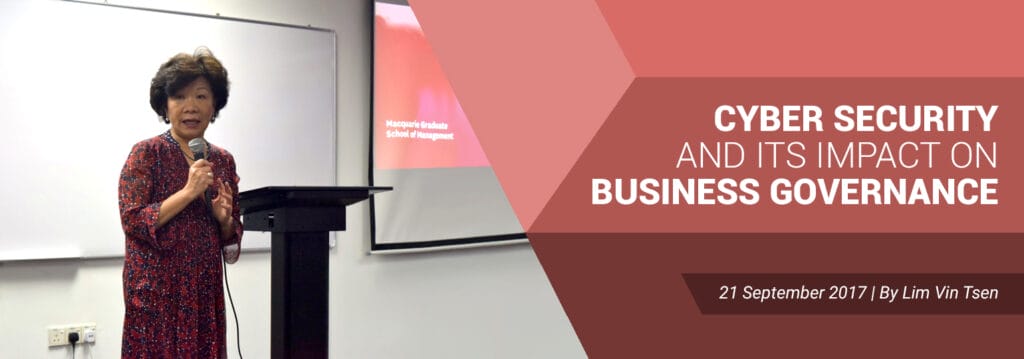
HELP University’s Faculty of Business, Economics and Accounting in collaboration with Macquarie University, Sydney CBD, Australia, hosted guest lecturer, Professor Philomena Leung, the Associate Dean of International and Corporate Engagement and Professor of Accounting and Governance in the Faculty of Business and Economics from Macquarie University as she gave a talk, titled, “Cyber security and its impact on business governance”.
The talk was an informative descriptive look into the growth of cyber threats online and how it affects today’s business corporate governance. Professor Leung began her lecture by describing to the students what cybercrime is all about and what are the different types of cybercrime that are being committed today. Cybercrime, said Professor Leung, is a computer-related crime that involves a hacking or breaching into a computer or a network to commit a crime.
She explained that cybercrime could potentially threaten a person or a business’s security and financial health and cited several high profile cases in the international news about big movie studios being blackmailed by hackers. Professor Leung also said that other forms of cybercrime include copyright infringement, unwarranted mass-surveillance, among others.
Professor Leung further explained that these cybercrimes and criminal acts are committed online against individuals or groups of individuals to willfully harm the reputation of the victim. These crimes may directly or indirectly cause some form of physical or mental harm or loss. The cybercriminals will use all forms of modern telecommunication networks such as the Internet, chat rooms, emails, notice boards, groups, mobile phones messaging and networking apps to commit their crimes.
Unfortunately, said Professor Leung, there are currently no international laws to fight or recognise these types of cybercrimes and although countries like Germany have formed laws to combat cybercrimes, such laws are still up for debate. She then pointed out that cyber hackers who have been caught have even been offered jobs by companies for them to test their cyber security integrity. This is because these cybercriminals commonly exploit weaknesses or gaps in online and internet policies and procedures such as the failure to check something more than once, making it easier to steal a company’s personal data.
Professor Leung pointed out that no business today can afford to ignore cybercrime. The losses that can incur from a cyber-attack – both direct and indirect, can result in downtime or costly lost productivity, loss of a company’s assets of finances or even stolen data that can be sold by these cybercriminals. Professor Leung stated that businesses today must adhere to a set of fail-safe practical protocols and remedial system policies that ensure cyber rules are set and followed. These rules must include ensuring that every employee of a company practice security awareness protocols such as cyber hygiene and that they must “clean” their computer after every use.
About the speaker
Professor Philomena Leung is the Associate Dean of the International and Corporate Engagement and Professor of Accounting and Governance in the Faculty of Business and Economics at Macquarie University. She has over 40 years of senior academic experience in tertiary education in Hong Kong and Australia, following her auditing career at Peat, Marwick, Mitchell & Co in Hong Kong. In her role as Associate Dean, Professor Philomena initiated the establishment of the multi-disciplinary Macquarie University Cyber Security Hub with colleagues from Science and Engineering, and Arts. The Cyber Security Hub has received enormous support from industry and commerce, including an inaugural sponsorship by Optus.
